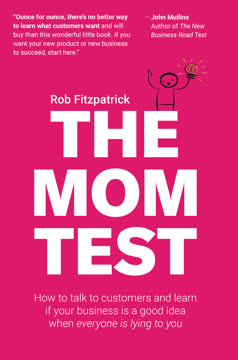Key Takeaways
1. Fundraising is an art: Prepare thoroughly and build relationships
"Raising capital is an art. Every single ingredient needs to be perfectly balanced in the process in order to secure capital successfully."
Preparation is key. Before approaching investors, entrepreneurs must have a clear vision, a well-defined business model, and a strong team in place. This includes:
- Developing a comprehensive business plan
- Conducting thorough market research
- Building a minimum viable product (MVP)
- Assembling a talented and experienced management team
Relationship building is crucial. Successful fundraising is not just about the numbers; it's about creating meaningful connections with potential investors. Entrepreneurs should:
- Network extensively within their industry
- Attend relevant conferences and events
- Seek introductions from mutual connections
- Cultivate relationships with potential investors over time
2. Craft a compelling story and pitch to capture investor interest
"Ultimately, the best entrepreneurs are not the best visionaries. The greatest entrepreneurs are incredible salespeople. They know how to tell an amazing story that will convince talent and investors to join in on the journey."
Develop a powerful narrative. Your startup's story should be:
- Authentic and engaging
- Clearly articulating the problem you're solving
- Demonstrating your unique value proposition
Create effective pitch materials. Prepare:
- A concise and compelling elevator pitch (30 seconds)
- A well-designed pitch deck (10-15 slides)
- A detailed executive summary (1-2 pages)
Practice and refine your presentation. Continuously improve your pitch by:
- Rehearsing with team members and advisors
- Seeking feedback from trusted mentors
- Adapting your approach based on investor responses
3. Understand different funding sources and their implications
"While angel investors contribute about five times less capital to startups than VCs, individual investments in startups grew by 36 percent from 2008 to 2012, while venture capital investments dropped by 8 percent, according to Dow Jones VentureSource."
Explore various funding options. Each source has its own advantages and considerations:
- Bootstrapping: Maintains control but limits growth
- Friends and family: Easy access but potential personal complications
- Angel investors: Provide expertise and connections
- Venture capital: Larger sums and strategic support
- Crowdfunding: Access to a broader investor base
Choose the right funding mix. Consider:
- Your startup's stage and capital needs
- Growth projections and timeline
- Desired level of control and dilution
- Industry norms and investor expectations
Understand the implications. Each funding source comes with:
- Different expectations for returns
- Varying levels of involvement in your business
- Potential impact on future funding rounds
4. Navigate term sheets and negotiations with care
"Do not underestimate the need for capital. Nothing will kill your venture and dream faster than running out of cash."
Understand key terms. Familiarize yourself with:
- Valuation and equity offered
- Liquidation preferences
- Anti-dilution provisions
- Board composition and voting rights
Negotiate strategically. Approach negotiations with:
- Clear objectives and deal-breakers
- Flexibility on less critical terms
- Professional legal counsel
Consider long-term implications. Think beyond the current round:
- How terms might affect future funding rounds
- Impact on your ability to attract talent
- Potential constraints on business decisions
5. Leverage the JOBS Act for new fundraising opportunities
"The signing of the Jumpstart Our Business Startups (JOBS) Act may well go down in history as one of the greatest moments during Obama's two terms in the White House."
Understand the JOBS Act provisions. Key components include:
- Title II: Allowing general solicitation for accredited investors
- Title III: Enabling equity crowdfunding for non-accredited investors
- Title IV: Expanding Regulation A+ for larger fundraising efforts
Evaluate new fundraising channels. Consider:
- Online equity crowdfunding platforms
- Broader marketing of your fundraising efforts
- Potential for reaching a larger investor base
Navigate regulatory requirements. Be aware of:
- Disclosure obligations
- Investor verification processes
- Ongoing reporting requirements
6. Avoid common pitfalls in the fundraising process
"Learn to Love Rejection."
Maintain realistic expectations. Understand that:
- Fundraising often takes longer than anticipated
- You may face numerous rejections before success
- The process can be emotionally challenging
Avoid common mistakes. Be cautious of:
- Overvaluing your company
- Neglecting due diligence preparation
- Failing to follow up with interested investors
- Ignoring red flags in investor behavior or terms
Stay focused on your business. Remember to:
- Balance fundraising efforts with ongoing operations
- Continue to hit milestones and show progress
- Be prepared to pivot or adjust your strategy based on feedback
7. Utilize technology tools to streamline your fundraising efforts
"There has never been a better time in history to be an entrepreneur. The Internet provides countless helpful tools and websites that can inform, and even guide, a startup businessperson on his or her journey toward business goals, especially when looking to raise investment capital."
Leverage organizational tools. Use:
- Cloud storage (e.g., Dropbox, Google Drive) for document management
- Project management software (e.g., Trello, Asana) for tracking tasks and milestones
- CRM systems to manage investor relationships
Employ research and analytics. Utilize:
- Market research tools (e.g., Manta, CB Insights)
- Financial modeling software
- Google Analytics for website performance tracking
Streamline communication. Implement:
- Email management tools (e.g., Boomerang, Streak)
- Scheduling software (e.g., Calendly, ScheduleOnce)
- Video conferencing platforms (e.g., Zoom, Google Meet)
By leveraging these tools, entrepreneurs can:
- Increase efficiency in the fundraising process
- Present a more professional image to investors
- Focus more time on building relationships and closing deals
Last updated:
FAQ
What's "The Art of Startup Fundraising" about?
- Comprehensive Guide: "The Art of Startup Fundraising" by Alejandro Cremades is a detailed guide for entrepreneurs on how to effectively raise capital for their startups.
- Step-by-Step Process: It outlines the entire fundraising process, from preparing your business for investment to closing deals with investors.
- Focus on Strategy: The book emphasizes strategic planning, understanding investor expectations, and leveraging storytelling to attract funding.
- Modern Fundraising Techniques: It also covers modern fundraising methods, including crowdfunding and the implications of the JOBS Act.
Why should I read "The Art of Startup Fundraising"?
- Expert Insights: Alejandro Cremades provides insights based on his experience as a successful entrepreneur and founder of Onevest.
- Practical Advice: The book offers practical advice and strategies that are applicable to real-world fundraising scenarios.
- Comprehensive Coverage: It covers a wide range of topics, from crafting a pitch to understanding venture capital dynamics.
- Up-to-Date Information: The book includes recent changes in fundraising laws and practices, making it relevant for today's entrepreneurs.
What are the key takeaways of "The Art of Startup Fundraising"?
- Preparation is Key: Proper preparation, including a solid business plan and understanding of your market, is crucial for successful fundraising.
- Investor Relations: Building and maintaining strong relationships with investors is essential for securing and retaining funding.
- Storytelling and Marketing: Effective storytelling and marketing can significantly enhance your ability to attract investors.
- Understanding the Landscape: Familiarity with different funding sources and the implications of the JOBS Act can provide a competitive edge.
What are the best quotes from "The Art of Startup Fundraising" and what do they mean?
- "Raising capital is an art." This quote emphasizes that fundraising is not just about numbers but involves creativity, strategy, and relationship-building.
- "You will never fail—you will either succeed or learn." This highlights the importance of resilience and learning from setbacks in the fundraising journey.
- "Ask for money, get advice. Ask for advice, get money twice." This suggests that seeking advice can often lead to financial support, as it builds trust and demonstrates openness to learning.
How does Alejandro Cremades suggest preparing for fundraising?
- Solid Business Plan: Cremades stresses the importance of having a comprehensive business plan that includes marketing and fundraising strategies.
- Know Your Market: Understanding your market and having a clear vision for your startup is crucial.
- Build a Strong Team: Having a talented and experienced management team can instill confidence in potential investors.
- Legal and Structural Organization: Ensuring your corporate structure is legally sound is vital for attracting investment.
What is the role of storytelling in fundraising according to "The Art of Startup Fundraising"?
- Engagement Tool: Storytelling is used to engage investors by making your business relatable and memorable.
- Highlighting Value: It helps in highlighting the unique value proposition of your startup.
- Building Emotional Connection: A compelling story can build an emotional connection with investors, making them more likely to invest.
- Differentiation: It differentiates your startup from competitors by showcasing your journey and vision.
How does "The Art of Startup Fundraising" address the challenges of raising capital?
- Realistic Expectations: The book sets realistic expectations about the difficulties and time involved in raising capital.
- Handling Rejection: It advises entrepreneurs to learn from rejection and use it as a stepping stone to success.
- Strategic Networking: Emphasizes the importance of strategic networking and building relationships with potential investors.
- Adapting to Feedback: Encourages adapting to feedback from investors to improve your pitch and business model.
What are the implications of the JOBS Act as discussed in "The Art of Startup Fundraising"?
- Democratization of Investment: The JOBS Act allows startups to publicly solicit investments, opening up opportunities to a broader range of investors.
- Crowdfunding Opportunities: It facilitates equity crowdfunding, enabling startups to raise funds from non-accredited investors.
- Regulatory Changes: The Act introduces regulatory changes that simplify the fundraising process for emerging growth companies.
- Increased Access to Capital: By expanding the pool of potential investors, the JOBS Act increases access to capital for startups.
What strategies does Alejandro Cremades recommend for crafting a successful pitch?
- Clear Messaging: Ensure your pitch has a clear and compelling message that resonates with investors.
- Focus on Value: Highlight the unique value and competitive advantage of your startup.
- Engage Emotionally: Use storytelling to create an emotional connection with your audience.
- Practice and Feedback: Continuously refine your pitch based on feedback and practice to improve delivery.
How does "The Art of Startup Fundraising" suggest dealing with investors?
- Building Relationships: Focus on building long-term relationships rather than just securing immediate funding.
- Transparency and Honesty: Be transparent and honest in your communications to build trust.
- Understanding Investor Needs: Understand what investors are looking for and tailor your pitch to meet those needs.
- Regular Updates: Keep investors informed with regular updates on progress and milestones.
What are the pros and cons of different funding sources as outlined in "The Art of Startup Fundraising"?
- Angel Investors: Pros include valuable advice and connections; cons can be limited funding amounts.
- Venture Capital: Offers large funding amounts but may involve giving up significant control.
- Crowdfunding: Provides access to a large pool of investors but requires significant marketing effort.
- Bootstrapping: Maintains control but may limit growth due to funding constraints.
How does "The Art of Startup Fundraising" address common fundraising mistakes?
- Lack of Preparation: Emphasizes the importance of thorough preparation and planning.
- Ignoring Feedback: Advises against ignoring feedback from investors and the market.
- Overvaluing the Startup: Warns against overvaluing your startup, which can deter potential investors.
- Poor Relationship Management: Highlights the need for effective relationship management with investors and stakeholders.
Review Summary
The Art of Startup Fundraising receives overwhelmingly positive reviews, with readers praising its comprehensive, practical advice for entrepreneurs seeking funding. Reviewers appreciate the clear, concise writing style and the insider perspective on investor mindsets. Many cite the book's value for both novice and experienced entrepreneurs, covering topics from crafting pitches to understanding various funding sources. Readers particularly commend the book's insights on crowdfunding, digital finance trends, and strategies for navigating the fundraising process efficiently. Overall, it's highly recommended for anyone looking to start or grow a business.
Similar Books










Download PDF
Download EPUB
.epub digital book format is ideal for reading ebooks on phones, tablets, and e-readers.




